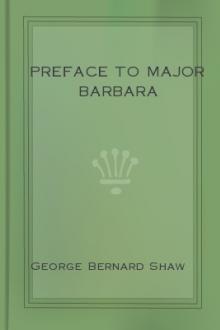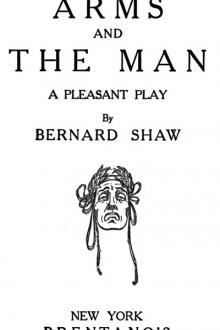author - "George Bernard Shaw"

o which many of my critics have fallen.Whenever my view strikes them as being at all outside the rangeof, say, an ordinary suburban churchwarden, they conclude that Iam echoing Schopenhauer, Nietzsche, Ibsen, Strindberg, Tolstoy,or some other heresiarch in northern or eastern Europe.I confess there is something flattering in this simple faith inmy accomplishment as a linguist and my erudition as aphilosopher. But I cannot tolerate the assumption that life andliterature is so poor in these

ave himself from cipherdom, find an affirmative position. His thousand and three affairs of gallantry, after becoming, at most, two immature intrigues leading to sordid and prolonged complications and humiliations, have been discarded altogether as unworthy of his philosophic dignity and compromising to his newly acknowledged position as the founder of a school. Instead of pretending to read Ovid he does actually read Schopenhaur and Nietzsche, studies Westermarck, and is concerned for the

obviously disregards all the canons and unities and other things which every well-bred dramatist is bound to respect that his work is really unworthy of serious criticism (orthodox). Indeed he knows no more about the dramatic art than, according to his own story in "The Man of Destiny," Napoleon at Tavazzano knew of the Art of War. But both men were successes each in his way--the latter won victories and the former gained audiences, in the very teeth of the accepted theories of war

ion, and perhaps enabled him to popularize his subject, but for his Satanic contempt for all academic dignitaries and persons in general who thought more of Greek than of phonetics. Once, in the days when the Imperial Institute rose in South Kensington, and Joseph Chamberlain was booming the Empire, I induced the editor of a leading monthly review to commission an article from Sweet on the imperial importance of his subject. When it arrived, it contained nothing but a savagely derisive attack

Description Major Barbara is a three-act play that premiered at the Court Theatre in 1905, and was subsequently published in 1907. It portrays idealist Barbara Undershaft, a Major in the Salvation Army, and her encounter with her long-estranged father who has made his fortune as a “dealer of death” in the munitions industry. Barbara doesn’t wish to be associated with her father’s ill-gotten wealth, but can’t prevent him from donating to the Salvation Army and eventually converting her family to

o which many of my critics have fallen.Whenever my view strikes them as being at all outside the rangeof, say, an ordinary suburban churchwarden, they conclude that Iam echoing Schopenhauer, Nietzsche, Ibsen, Strindberg, Tolstoy,or some other heresiarch in northern or eastern Europe.I confess there is something flattering in this simple faith inmy accomplishment as a linguist and my erudition as aphilosopher. But I cannot tolerate the assumption that life andliterature is so poor in these

ave himself from cipherdom, find an affirmative position. His thousand and three affairs of gallantry, after becoming, at most, two immature intrigues leading to sordid and prolonged complications and humiliations, have been discarded altogether as unworthy of his philosophic dignity and compromising to his newly acknowledged position as the founder of a school. Instead of pretending to read Ovid he does actually read Schopenhaur and Nietzsche, studies Westermarck, and is concerned for the

obviously disregards all the canons and unities and other things which every well-bred dramatist is bound to respect that his work is really unworthy of serious criticism (orthodox). Indeed he knows no more about the dramatic art than, according to his own story in "The Man of Destiny," Napoleon at Tavazzano knew of the Art of War. But both men were successes each in his way--the latter won victories and the former gained audiences, in the very teeth of the accepted theories of war

ion, and perhaps enabled him to popularize his subject, but for his Satanic contempt for all academic dignitaries and persons in general who thought more of Greek than of phonetics. Once, in the days when the Imperial Institute rose in South Kensington, and Joseph Chamberlain was booming the Empire, I induced the editor of a leading monthly review to commission an article from Sweet on the imperial importance of his subject. When it arrived, it contained nothing but a savagely derisive attack

Description Major Barbara is a three-act play that premiered at the Court Theatre in 1905, and was subsequently published in 1907. It portrays idealist Barbara Undershaft, a Major in the Salvation Army, and her encounter with her long-estranged father who has made his fortune as a “dealer of death” in the munitions industry. Barbara doesn’t wish to be associated with her father’s ill-gotten wealth, but can’t prevent him from donating to the Salvation Army and eventually converting her family to